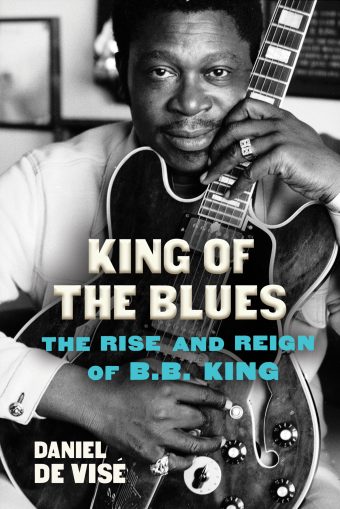On December 7, 1956, B.B. returned to Memphis for the Goodwill Revue, WDIA’s annual benefit concert to help the city’s poor Black children. B.B. was a headliner that Friday night, along with Ray Charles, whose career and B.B.’s were rising apace. Organizers wondered if they could get Elvis, now a bigger star than either B.B. or Uncle Ray, to make a guest appearance. It was a big ask: the Goodwill Revue was an all-Black show, and Elvis would be very nearly the only white person in the Ellis Auditorium if he turned up. Elvis gave his enthusiastic assent, though he could not perform: his contract with RCA forbade it. So Elvis stood quietly in the wings and watched his heroes. Near the end of the show, Rufus Thomas led Elvis to the stage. Elvis greeted the throngs with one of the leg gyrations the television networks would not show. The audience screamed and rushed the stage. Police whisked Elvis off.
Elvis found B.B. backstage. They posed for pictures, Elvis in a striped jacket and tie, B.B. in a white tuxedo, both men wearing easy, crooked smiles. B.B. had watched Presley’s rise with a mix of fascination and envy. “The new stuff was R&B sung by a good-looking white boy,” he recalled, with a measure of irony. Still, B.B. couldn’t help but like Elvis, and his presence at the Revue spoke volumes: “I believe he was showing his roots. And he seemed proud of those roots.”
The iconic image of Elvis and B.B., arm in arm at the peak of each man’s youthful fame, would become the stuff of legend, particularly among Elvis fans seeking proof that the King had honored his rhythm-and-blues forebears. It was no act. Elvis treated B.B. “like royalty” that night, the bluesman recalled, recounting how B.B. had inspired his career.
Black teens remained smitten with Elvis, buoying “All Shook Up,” “Teddy Bear,” and “Jailhouse Rock” in turn to the top of the R&B charts at a time when B.B. was scrapping for hits. That stoked resentment. Nat Williams mused in his syndicated column, “How come cullud girls would take on so over a Memphis white boy . . . when they hardly let out a squeak over B.B. King, a Memphis cullud boy?”
B.B. spoke diplomatically of the rock ’n’ roll revolution as it unfolded. Decades later, in a moment of candor, he would dismiss the genre as “just more white people doing blues that used different progressions”: “Elvis was doing Big Boy Crudup’s tunes, and they were calling that rock and roll. And I thought it was a way of saying, ‘He’s not black.’”
